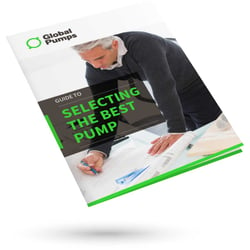
If you've bought a reliable pump and it has been correctly installed, you shouldn't have any issues for many years. But it's important to remember industrial and mining pumps are moving large amounts of material or corrosive liquids and eventually there is bound to be a wear and tear which needs to be rectified. Common problems can often be remedied with regular maintenance, but if a pump is not running efficiently, or won't pump, then the problem could be more severe.
But don't panic. At Global Pumps we are dedicated to solving problems in a time efficient and cost effective manner. We can help identify and rectify issues as well as recommend preventative maintenance procedures.
With this in mind, let's take a look at 5 things you should check when your pump isn't working correctly:
-
Power Source If your pump has stopped working, or is not operating to the levels you expect, it could be a power issue. Look at the factory specifications for your pump and ensure that it is receiving the correct electrical power supply in order to work properly. Ensure that all electrical wiring is in good condition, that there are no loose connections and that the electrical current is reaching your pump in the first place. If you have an air operated pump, make sure that the compressor is in good working order. Lastly, if you are using a mains supply, call in a professional to assess whether your mains electricity is stable or not. Surges and/or dips in supply can seriously affect pump performance, this is often a problem with dosing pumps. A surge protector can help to some degree.
-
Sound One of the first tell-tale signs of an underperforming pump is the sound that it makes. A change in sound can alert you to an issue with your pump or system. If you hear popping sounds, especially near the impeller, you could be experiencing cavitation. This occurs when there are pressure changes within a liquid, causing tiny pockets of air to form and then implode. This can seriously damage your pump, especially the impeller, so check to see if there has been any signs of cavitation such as eroded material. While your pump will produce a natural hum, it should not be making any strange noises, if it is, this indicates something is wrong.
-
Alignment & Leakage Is your impeller aligned correctly? Is your piping correctly installed? A properly installed pump system does not overly vibrate. It does not generate excessive heat. If there is anything leaking from your pump or fittings, then this probably indicates an issue as well. Depending on the media you are pumping, it could be a serious health and safety problem which must be rectified immediately.
-
Wear & Tear No matter how rugged your pump system is, it will eventually suffer from wear and tear. How old are your components? How old is your pump? If you've had your pump for many years then it might need to be replaced. Check for visible signs of wear and tear such as residue or deposits within your system which have broken off of your pump, pipe, valve or fitting interiors. It is possible that you only need to replace one component rather than the entire pump or piping system.
- Factory Performance
Always know what you should expect from your pump and other components. What are the factory specifications? Have you met them? Is your pump performing to expected standards? If you are not getting the head pressure or flow you think you should, then that immediately tells you that there is either an issue with components, installation, or system layout. Here you will find 5 Things to Know Before You Invest in a New Pump.
Solve Your Pump Problems Today
It can be a complex and time consuming process to figure out why your pump system isn't working the way it should. Minimise this stress today by reaching out to our service team across Australia. Call us on 08 8275 8000 or email us at sales@globalpumps.com.au to organise a review of your installation. Whether you're in New South Wales, Queensland, Victoria, or beyond, we’ll help you get your system back to peak performance in no time.


